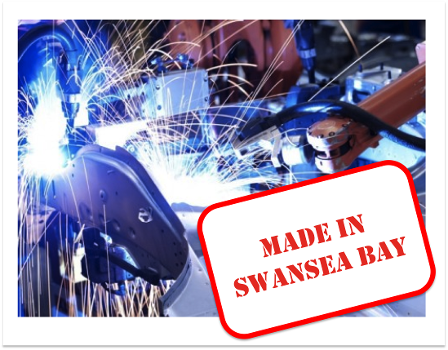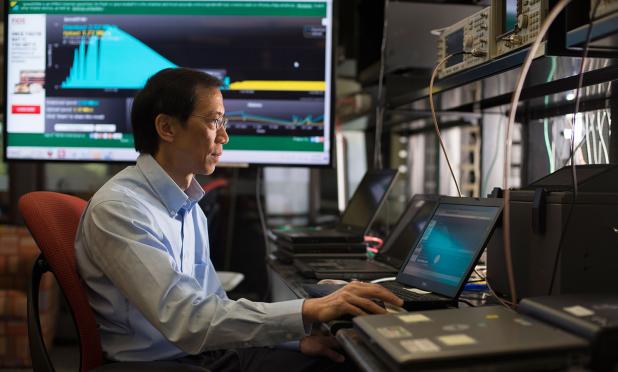We need to make more of manufacturing
South Wales Evening Post - 24 September 2013
QUITE some time ago, I was driving out of a car park in an Essex industrial estate and stopped to let a mother and son cross the road. As they passed I heard the youngster ask what went on inside the huge building I had just exited.
He was told sternly, "That's where you'll end up if you don't do well in school."
As it happens, the place in question was the European engineering and research headquarters of one of the world's largest automotive manufacturers.
I wasn't too surprised by what I'd heard. I'd stopped years ago from trying to wise up misguided folks who believed a blue oval logo on the outside of a building must mean that the interior was full of people doing mundane tasks in noisy, grubby surroundings.
It's true that some of the work was like that and still is today. Yet anyone who thinks that manufacturing is all about low-paid manual labour and a low level of personal achievement remains very wrong on all counts.
As someone with close on 40 years background in industry, I'm here to tell you that the skills needed to set up a programmable machine tool would more than challenge your average desk geek.

Designing a commercially viable manufacturing workflow or a robust quality management system needs degree-level qualifications backed up by some serious technical expertise.
And yet I still encounter young people who have picked up the thinking in school that manufacturing is a second-rate career choice where you just make widgets all day.Economic experts often lament the decline of manufacturing and then add sagely how the old nationalised heavy industries were untenable.
That's as may be, but it's funny that the use of national resources to bolster excessive reward systems and unsustainable working practices didn't seem to be such a big issue when the banks went into meltdown for much the same reasons. Anyway, moving on …
Something that gets forgotten about all those 'unproductive' state-owned industries is how they managed to regularly supply the private sector with trained, skilled personnel and even occasionally churned out an entrepreneur or two.
There's not much chance of that happening today given the appalling level of activity in the sector. The most recent economic profile for Swansea shows only 4.9 per cent are employed in manufacturing. This is bad enough in my book but what's worrying is that the figure is less than half the Welsh average.
By comparison, local data shows 11% employed in retail with a similar percentage in public administration. What came as a surprise to me as it probably will to you is that the single largest employment group (19 per cent) is the health sector.
An influential Welsh economic think-tank is hosting a conference next month.
The theme is about questioning whether Welsh public services can thrive without the market.
Ask Alan Brayley of AB Glass and he will tell you that the question should probably be posed the other way around. The vast majority of the work undertaken by his Fforestfach-based firm comes from new school and hospital construction.
What he will also tell you is that a critical skills shortage is hampering his company's competiveness and its ability to attract new work. Alan has managed to supplement his workforce with trained people from Romania where engineering remains a valued occupation. Even so he is painfully aware that if an economic recovery is indeed on the way then local manufacturing firms like his will struggle to take full advantage.

Between them, Malaysia, Japan and Korea outstrip Western Europe when it comes to R&D spend
There's no denying that we don't hold manufacturing to as much a key part of our economy as other nations. According to former colleagues of mine, there are more doctorates awarded in Germany each year in engineering disciplines than in human sciences.
It's claimed that Malaysia, Japan and Korea between them spend almost twice that all of Western Europe nations on technological research and development.
Firms like Tata Steel know that successful manufacturing comes from supporting innovation in production techniques whilst developing new product lines and improving existing ones.
They are justifiably proud of their recently rebranded armour steel products. Their challenge now however is how to continue translating engineering success into improved productivity.
There is undeniably a chicken and egg problem at all levels of industry that is crying out to be resolved.
We have a distinct skills shortage in our part of Wales but also a badly depleted manufacturing sector capable of providing employment & training opportunities.
Clearly it's not solely a matter of investment. What's needed is a step-change in education and social awareness that challenges any suggestion that engineering & manufacturing represents a low-grade career path.
That's why I was delighted to read an advert by Swansea Metropolitan University offering £3,000 bursaries to potential foundation students for a route towards gaining diploma and degree levels in automotive engineering, computing, digital media and manufacturing engineering.
It's a step in the right direction and one I hope is followed up by more schools engaging young minds on how they can quite literally help to shape their own futures.
About a decade ago I was involved in advanced discussions to build a Challenger Centre in Swansea.
This is a Nasa-branded educational facility that promotes interest in science & technology in youngsters through simulated missions, team challenges and controlled experiments.
It never quite got off the ground, so to speak, but it's still something that remains on my agenda.
It's a little ambitious but no less achievable when you consider that a section of the old Ford plant in Fabian Way where people once made camshafts and connecting rods is now a street scene from Renaissance Italy and the former canteen is occupied with CGI suites staffed by post-production teams.
What I'm trying to say is that no matter what the industry or the sector involved, we should aim to support any measure that can go towards seeing an increase in the number of products that bear the label, "Made in Swansea Bay".